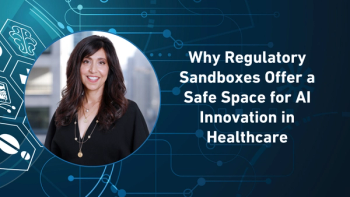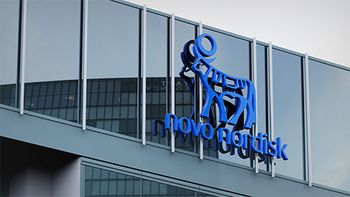
- Pharmaceutical Commerce - June 2018
- Volume 13
- Issue 2
A Conversation with Louis Roy, Optel Group
Traceability will lead to better pharma supply chains and ultimately, a better social environment
Optel Vision—now Optel Group—has been a leader in developing the machine vision systems integral to the labeling and inspection processes on pharma packaging lines, a business it has focused on for over a decade. In fact, the company traces its roots back to the late 1980s, when company president Louis Roy graduated from engineering school, with a goal of applying automation technology to solve manufacturing problems. Fast forward to 2017, and the company is now going beyond the pharma traceability topic that has been its bread and butter. It is now positioning itself to developing “intelligent supply chains” for all parts of healthcare (pharma, medical device and health systems) as well as agro-food businesses and other consumer goods. An acquisition was made last year for an enterprise-level traceability software platform (Verify Brand) and, in February, a geomatics company (GeoTraceability) that specializes in traceability tied to geolocation. Once brought together, Optel Group will have the potential to provide traceability from raw materials (food, APIs, medical components) through the manufacturing processes, and on to the consumer.
That goal might be getting ahead of Optel’s industry clients, but according to Roy, that’s just fine. “We are on a mission,” he says, “to solve society’s problems.” These problems include: the patient risks of counterfeit medicines; the waste in pharma and medical device supply chains; and the overall goal of sustainable economic activity in the face of climate change. To these ends, Optel has gone through the evaluation process of becoming a “certified B corporation.” (B Lab, which runs a certification process, is a global nonprofit founded in 2006, with the trademark ed slogan of “people using business as a force for good.” Nearly 1,000 companies had passed the fairly rigorous certification process in 2014, according to B Lab data on its website.) Roy says that Optel’s commitment is to its customers, its employees, and to future generations.
An indirect validation of this comprehensive approach can be seen from Optel’s leadership in the Canadian government’s Innovation SuperCluster Initiative, under which public and private funding will support the AI-Powered Supply Chain Consortium, in which Optel joins with 120 other Canadian companies to support R&D in this area.
Pharmaceutical Commerce sat down with Mr Roy recently; here’s what he had to say.
How did Optel start, and what was it doing in its early days?
I founded the company in 1989 at the end of my engineering education, after I had had a great introduction to computers, industrial automation and artificial intelligence. I had a goal at that time of using the technology I had learned to make a difference in our society. In our early days, we went from one manufacturer to another, asking “What can we do for you?” We were involved in a number of interesting projects over the next ten or so years, and then in the mid-2000s decided to focus on the pharma supply chain. This is around 2007-8, when the US pharma industry was dealing with the California e-pedigree legislation.
With our focus on automation and vision systems, we saw that we were the most high-tech components on a pharmaceutical packaging line, and so we felt it was our natural place to develop the traceability technology that is now being installed around the world. “Traceability” means, being able to generate and gather data, and then using mathematics to do something useful with it. The near-term goal is compliance with the laws we have now—the Drug Supply Chain Security Act or the Falsified Medicines Directive in Europe, or the other regulations around the world—but the goal should be to go beyond compliance to connecting with the consumer.
In the mid-2000s, with some decidedly energetic pushing from FDA, the US pharma supply chain was looking closely at the adoption of RFID technology, which complements or even supersedes barcode technology. Did Optel engage with this technology? Are you looking at it now as some pharma applications of it still exist?
I was a skeptic at that time, and I still am about the usefulness of RFID. We did a pilot with the technology around then, and it was very easy in the case of plastic bottles with RFID tags on them. The pilot even included aggregation (gathering item data into packaging cases, and then the case data into pallets.) But the presence of water or metal interferes with RFID signals, and between the price of the tags, and the physical difficulties of penetrating fluids or metals to read a tag in the middle of a pallet, RFID is not there yet, and unless there’s some new physics, it will not be there later.
For the traceability implementations going on now, Optel puts an emphasis on its own engineering teams to install and start up a system. Why do you think this makes a difference in the market?
When we started developing manufacturing automation systems, we did things like making our own printed-circuit boards. But we quickly learned that it made more sense to acquire components like cameras, computers and printers from companies that specialize in those technologies, and to specialize ourselves in integrating the systems into manufacturing.
For many years now we have been building and implementing our own systems. It has been important for us to spend a lot of time on the factory floor with customers, to learn what their inventory management problems are and to advance our technology. Serialization and traceability technology has matured in recent years; now the value is in the network that can be created across a supply chain. As a result, we are more open to partnering with systems integrators and other technology partners.
Recently, Optel has extended its scope into Level 4 traceability with the acquisition of Verify Brand. Does the “one-stop shop” aspect of this decision make a difference to customers, some of whom prefer a “best of breed” approach to assembling their overall solution?
There is the marketing position of being a “one-stop shop” to solve a client’s problems, and I understand that position. Verify Brand stands out as a serialization platform that reaches all the way to the consumer.
However, there is a much bigger goal that we are after. Even today, pharma supply chains are insecure, prone to creating waste, and highly inefficient. It’s ridiculous, in my opinion, to see what the industry goes through for a product recall, because they cannot track their products all the way through the supply chain. People die from counterfeit drugs because the supply chain security is weak. The last-mile problem in today’s supply chains is a nightmare, destroying much of the value of all the work being done on traceability on the manufacturing side.
For the past two years, I took a step back to look at our business, which is currently about establishing compliance with the national laws around the world. That’s important, but it is only a part of the solution. Even in Europe with the FMD regulations, it’s just an aspect of the supply chain; it doesn’t extend to the patient. Overall, in the context of how Optel can create positive impact on society, we have a vision that we need to connect to people. In the next 10 years, we will see a convergence of supply chains, running from raw materials, through manufacturing and production, and on to the consumer.
Our goal is to optimize the supply chain, and with a connection direct to the consumer. No one on the market is doing that now; everyone is focused on compliance and brand protection. We have a clear vision to create added value for our clients. You can’t really do supply chain optimization if your network is only part of the supply chain, and we think serialization is the key to allow optimization of all process both inside and outside of manufacturing. We’re the only vendor doing that.
Does the same logic apply to the acquisition of Geotraceability, which tracks raw materials like food and natural resources from their source?
Geotraceability currently operates in agriculture and food, and so for us this represents a new market opportunity. I have structured Optel internally so that there are dedicated pharma teams and food teams, so the pharma industry doesn’t have to worry about divided attention from us. But it’s interesting to realize that supply chains in these two industries have many similarities. Food starts with agriculture and minerals, and pharma APIs start with many of the same suppliers. On the consumer side, there are many of the same customers—Walmart, for example, sells food and sells pharmaceuticals. The only divergence is in the middle with manufacturing and processing. Optel’s goal is a data-driven, optimized, intelligent supply chain, and that is only possible when the supply chain network is fully integrated.
Finally, Optel has made a substantial effort in the direction of sustainability and social responsibility. Optel is one of the few companies in the pharma traceability arena that is a designated “B” corporation. Why is this important to Optel, and—more importantly—what does it mean for Optel customers?
As I’ve said, our focus on social good has been there since the beginning. Today, there’s a trend: we’ve started noticing that competitors are using the same language as we do to talk about social responsibility. We’re hearing about companies treating their employees with respect, and about respect for the environment. I like that! A lot of this is based simply on trust: building trust is something no one can be against.
Our approach carries over to other actions where we have taken a leadership role. Optel was instrumental in starting the Open SCS Consortium, which is something that will benefit everyone involved in pharma supply chain traceability [Ed. note: Open SCS is an effort of leading vendors to agree on standards for various types of traceability communications and connectivity, thus reducing the amount of customization that traceability implementations require.]
Socially responsible business practices are critical to our future.
Articles in this issue
over 7 years ago
Supplier Spotlightover 7 years ago
Blockchain to the rescue?over 7 years ago
Pharma traceability lumbers alongNewsletter
Stay ahead in the life sciences industry with Pharmaceutical Commerce, the latest news, trends, and strategies in drug distribution, commercialization, and market access.





